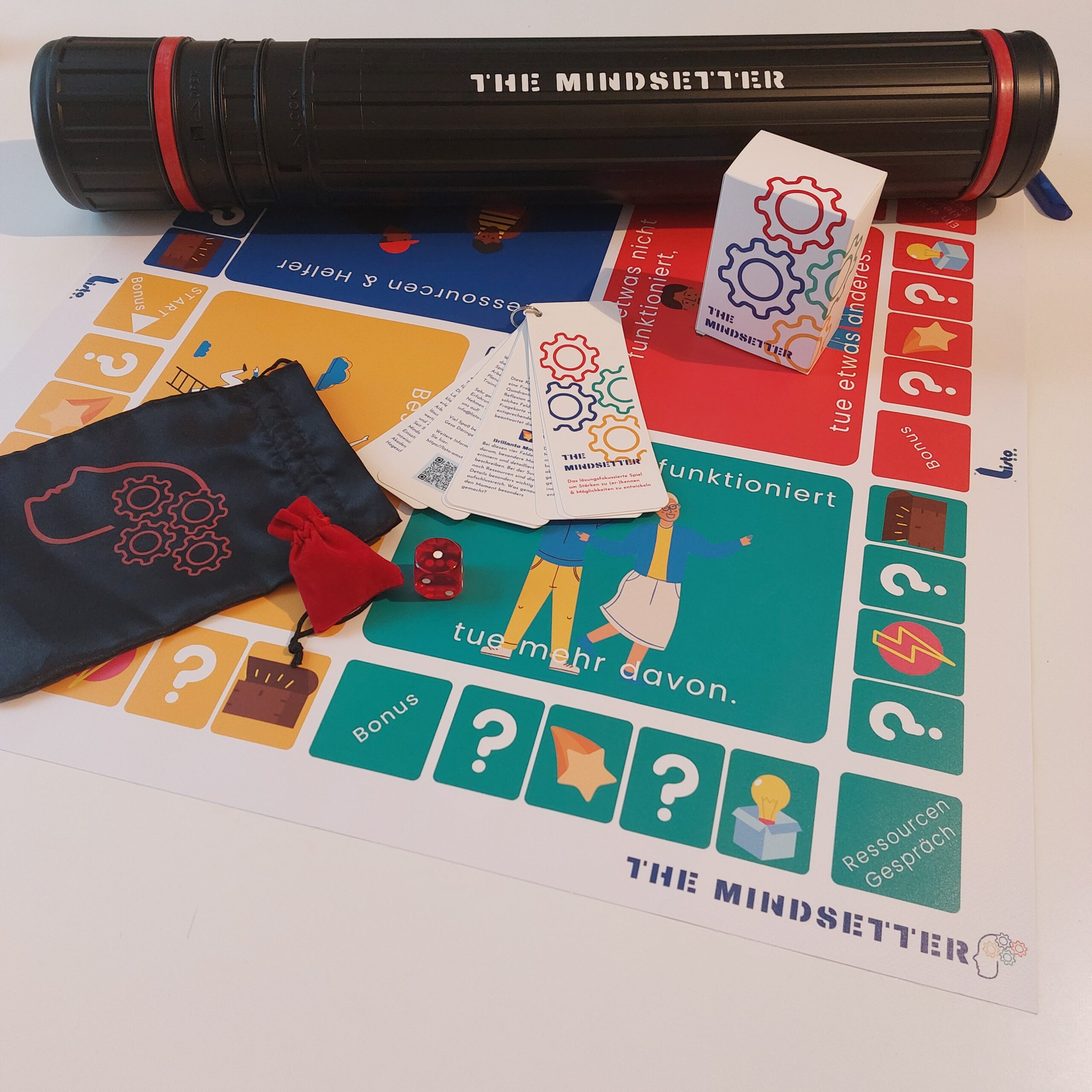Listo Amsterdam
The Mindsetter
“The game is a refreshingly interactive and engaging experience that blends the principles of solution-focused therapy with gamification, resulting in an innovative and powerful tool that could be used in a range of ways – for personal reflection, as a learning experience, and for personal/professional development.” Volkert, A. (2023). The Mindsetter Game by Gesa Doringer. Journal of Solution Focused Practices, 7(1). https://doi.org/10.59874/001c.89677
The Mindsetter- discover, reflect and co-create.
The Mindsetter Game is an innovative solution focused (SF) intervention. This versatile tool is available in two versions. The first was developed to apply the SF approach in therapy and coaching sessions. And the second to teach it in workshops and training. In both versions the game has proven to effectively offer a safe space for reflexion and co-creation. It sets the stage for new ideas and first steps towards the outcome a client, student or team member is hoping for. All of that is making it an excellent addition to the professional toolkit of experienced SF professionals and those new to the approach alike.
Co-creation:
The Mindsetter was published in 2023 and is available in 3 languages (English, German and Dutch). So far, the Mindsetter Game is being played in many countries worldwide and one game has travelled as far as Antarctica. The process of design thinking continues: The international game facilitators are as diverse as their contexts and clients. They all keep helping to further develop and enrich the game with their feedback, ideas and enthusiasm. And they are experiencing and proving how game-based learning and SF together provide both depth and light-heartedness!

The mindsetter game
discover, reflect and co-create
The Mindsetter in coaching and therapy
The coaching/ therapy version is holding space for people and their preferred future. The 96 questions of the four quadrants invite players to define a goal and…
…imagine their preferred future (Quadrant 1: Best hopes),
What will achieving their best hopes look like in everyday life? What difference will that make?
…become aware of what’s already working (Quadrant 2: “If something works, do more of it.”)
What are the first small signs of positive change? What tells the client that the desired future is possible?
...re-tune (Quadrant 3: “If something doesn’t work, do something different”). What skills can they develop? What do they want to experiment with?
…identify helpers and resources (Quadrant 4).
Which people, skills, hobbies, personal strengths, strategies or other factors are supportive and helpful? And what else?
Solution focus and game-based learning:
The players are invited to look at their goal and the path towards it from different perspectives. Furthermore, the game stimulates collaboration and co-creation. Participants witness each other’s process and progress. As a former participant put it: “Talking about your goal in the presence of others gives it a new level of importance. Together they celebrate successes or co-create new ideas. They are even encouraged to cheat (= change the rules of the game). The coach or therapist is invited to trust the process and lead from behind: “The game” is asking the questions.
The Mindsetter in teaching SF- A firework of reflexion
The training version of the game facilitates an active and collaborative knowledge acquisition. It invites students and practitioners to reflect on their way of working through an SF lens by asking them to:
…share and discuss what’s already working (Quadrant 1: „If something works, do more of it.”)
If we see them at work on a really good day: What de we notice about them? Which interventions do they like using at what makes them so valuable?
... explore and experiment: What would they like to see or do differently and what difference will that make? (Quadrant2: “If something doesn’t work, do something different”). Which positive change have they made in their workstyle and what was the effect? What are their professionl goals and difference will that make?
… reflect on the process of co-creating with the client (Quadran 3: Leading from one step behind) If the client is the expert, what’s their role? How can they use their experience in such a way that they still adopt a “Not knowing stance”?
… And what to do if something isn’t even broken but they feel like they ought to be fixing it anyway? (Quadrant 4: If something isn’t broken, don’t fix it).
What are their next steps if a client cannot describe a goal or desired future? How do they stay cooperative if- for whatever reason- they disagree with the client’s goal (e.g. out of genuine concern for the safety of the client or others around them).
True to the objective of ‘serious gaming’, the Mindsetter allows players to grasp the new knowledge and internalise it efficiently. The playful framework creates a sense of connection in the small groups, making it easier for insecure or reserved participants to open up. This benefits the learning environment significantly. The SF questions inspire a change of perspective and invite participants to define their own goals and implement behavioural changes where they wish to do so.
